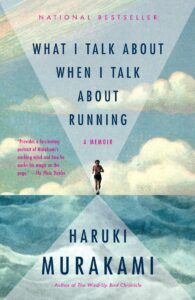 “I have looked deep inside myself, trying to detect something that might be there. But just as our consciousness is a maze, so too is our body. Everywhere you turn there’s darkness, and a blind spot. Everywhere you find silent hints, everywhere a surprise is waiting for you.”
“I have looked deep inside myself, trying to detect something that might be there. But just as our consciousness is a maze, so too is our body. Everywhere you turn there’s darkness, and a blind spot. Everywhere you find silent hints, everywhere a surprise is waiting for you.”
Haruki Murakami in What I Talk About When I Talk About Running. New York: Alfred A. Knopf, 2008, p. 98.
To run, intransitive verb. In this context, the intransitivity of the verb is not merely a grammatical contingency. Why run? Run from whom or what? Run where? I’ve often heard these questions. And the answer has always been on the tip of my tongue: one runs because it makes no sense at all.
Paraphrasing Haruki Murakami implies great responsibility. What I Talk About When I Talk About Running[1] is a tribute to honesty, to simplicity, to the mystery of life. Murakami runs in order to write, and his book centers around the interdependence between these two activities. Unlike most of his other novels, in which Murakami – one of the greatest writers of our time – addresses melancholia, loneliness, cruelty, love and heartbreak, this memoir deals with the rawness of the body: its needs, its reactions, its pains, its surprises. And he bases this on how he responds to the act of running. If Murakami didn’t run, he probably wouldn’t write.
“But those of us hoping to have long careers as professional writers have to develop an autoimmune system of our own that can resist the dangerous (in some cases lethal) toxin that resides within. […] But you need a great deal of energy to create an immune system and maintain it over a long period. You have to find that energy somewhere, and where else to find it but in our own physical being?”[2]
He finds it in the act of running.
What would psychoanalysis have to say about running? When psychoanalysis talks about running, it talks about the body.
 We, human beings, have bodies. Animals, on the other hand, are their bodies. They possess the incredible wisdom of instinctual guidance, and they are sure about what to do with their bodies. We aren’t. We struggle to find out how to control it, education aims to tame it, we need science to instruct us, we suffer in hospital beds, we stuff ourselves with medications and drugs. We tattoo ourselves, we subject ourselves to invasive tests, we eat unnamable things. Humanity uses bodies in wars, torture sessions, indescribable experiments. We also sing, dance, act, paint, sculpt, write: we make art. And we run.
We, human beings, have bodies. Animals, on the other hand, are their bodies. They possess the incredible wisdom of instinctual guidance, and they are sure about what to do with their bodies. We aren’t. We struggle to find out how to control it, education aims to tame it, we need science to instruct us, we suffer in hospital beds, we stuff ourselves with medications and drugs. We tattoo ourselves, we subject ourselves to invasive tests, we eat unnamable things. Humanity uses bodies in wars, torture sessions, indescribable experiments. We also sing, dance, act, paint, sculpt, write: we make art. And we run.
To make matters worse, we’re bipeds. Observe a cheetah running majestically across the African savannah, its weight distributed harmoniously across all four paws. The cheetah was made to run. We carry the full weight of our bodies on two measly legs, which suffer terribly when our feet hit the ground. We weren’t made to fly, we fly. We weren’t made to run, we run.
What is the speaking body? “Ah, that’s a mystery”, said Lacan[3]. The human body, marked by significance, is a body comprehended as a set of signifiers: a “speaking body”. It is therefore marked not only by the symbolic, but also by jouissance. This “small” detail makes all the difference: it disarrays, disorganizes, it causes angst, it scars us, it traumatizes us. Thus “life is not reduced to body in its beautiful and evident unity”[4].
The body-organism is entirely foreign to the subject. The subject’s body is a body which has been, in some way or another, vivified by its mother tongue, and permeated and affected by the signifier. The living body is not the animalistic body; it is a denatured organism. The fact that it speaks, or is a speaking body, Lacan reminds us, necessarily means that the human animal cannot proceed unscathed or unaffected. Freud, with his theory of the drive, warned us about this human condition: a concept which is at the limit between the physical and the psychical, and which therefore lies within neither one, nor the other. The body and its drive stimuli produce an effect of exteriority in relation to the narcissistic unity which is the ego, resulting in estrangement. Therefore, there is no direct, immediate or harmonious relationship between subjectivity and the body. Lacan tells us that the relationship between the speaker and his or her body is not ontological, but proprietorial: “D’MAN. Basic MAN. D’MAN has-a-body and haz’only-one. It has to be said like this: he has’un… and not: he iz’un… (know/est). It’s the having not the being that characterizes him. […] ‘I have it’, that’s his only being”.[5]
Affected and permeated by the word, the human being loses its direct relationship with the body. Therefore, the human being is a lack-in-being: his being no longer identifies itself with the body. He can only have or owna body. But what will he do with it?
Bodies rebel. Was this not how the hysterics inaugurated psychoanalysis? Their somatic symptoms, which medical discourse failed to grasp, led Freud to realize that the organic register was insufficient in apprehending these phenomena, which in turn led to his invention of this device or concept, which addresses a different register altogether – that of words and meaning – in order to find its translation.
“Psychoanalysis could begin because it was interested in hysteria, and what characterizes hysteria is what we find in the body sick of truth. Freud expressed it in terms of repression and the return of the repressed. The hysterical body refuses the dictates of the master signifier. It parades itself in pieces, in some way separated from algorithms, from the knowledge inscribed in its substance”.[6]
Lacan called this the “refusal of the body”: the refusal of the body to obey natural knowledge, to serve self-preservation, but also its refusal to adapt itself to the dictates of the master. The experience one has of the body is twofold: it is that which is most familiar – thirst of life – while also being that which is entirely foreign to the subject.
The explosive combination of science and capitalism, which shows its deadly face in the new forms of subjectivity, brought about by the vicissitudes of neoliberalism, which aims to create the “man-enterprise” or “entrepreneurial subject”[7], sends the body into a paroxysm of exhaustion in the frenzied search for “self-improvement”.
The model in question promotes the overcoming of limits in order to achieve maximum efficiency in a competitive regime that rules over all levels, making it seem as if – and this is the ace in the hole – the individual himself were being benefited, not the great international economic organisms, the real oligarchical bloc which holds undeniable sway over politics today.
The subject created for maximum fulfillment requires a managerial discourse which implies the use of multiple techniques, the objective of which is the creation of the man-enterprise: they are the “asceses of performance”, coaching, neurolinguistic programming, transactional analysis, psychological sayings meshed with rational and empirical argumentation. The source of efficiency must be found in the individual himself, not in an external authority figure.
These body-objects thus become exhausted. In a state of burnout, they fall sick, they become depressed, they die.
In Chile, on October 8th, when the increase in subway fares for rush hour was announced, triggering a wave of protests which shake the country to this day, the Minister of Economy stated that “those who wake up earlier will be benefited. Those who go to work earlier will pay lower fares”. His speech sparked the ire of the Chilean population, already worn out by the demands of maximum productivity. Wake up even earlier? Had these bodies reached the limit of resistance? Yet these are the same bodies which, when protesting – the streets are teeming with bodies-subjects that rebel against their condition as bodies-objects – are shot at by the bullets of repression. Over 160 people were hit in the eyes and were totally or partially blinded.
 What does one do with a body that has been traumatized by the intrusion of language, disturbed by the exigencies of its drives, violated by the imperative demands of our age?
What does one do with a body that has been traumatized by the intrusion of language, disturbed by the exigencies of its drives, violated by the imperative demands of our age?
Disarrayed by surplus-jouissance (which causes a feeling of inadequacy), exhausted by the constant demands for knowing and doing, drained by the search for meanings, my body’s way of being-in-the-world was marked by suffering. At first, running came as an extension of that chain: run to overcome limits, compete, offer oneself for sacrifice. In fact, nothing is more conducive to the commands of neoliberal ideology than sport in its embodiment of high performance and maximum competitiveness. And nothing, too, is more suited to the overflow of jouissance.
But, little by little, the act of running takes on a different aspect. The deflation or emptying of the imaginary, the reduction of jouissance – effects of psychoanalysis – make the race a place or locus wherein the body feels more at ease with itself, distancing itself from feelings of inadequacy and inaugurating, as it were, a know-how [savoir-faire]: instead of sacrificing, instead of overcoming limits, instead of pain, we find a satisfaction free from excess, a know-how that has pleasurable effects. In this process, one’s gradual distancing from the Other allows a kind of shared solitude to surface – felt, for instance, when, at the start of a race, we are all ones-alone [Uns-tout-seul], and yet at once we come together in our virtually synchronized breathing.
Nowadays, my day-to-day as a psychoanalyst seems to be in step with my running, in a relationship that is similar, I dare say, to the relationship between Murakami’s running and writing.
[1] MURAKAMI, H. What I Talk About When I Talk About Running. New York: Alfred A. Knopf, 2008.
[2] Ibidem, p. 46.
[3] MILLER, J.-A. “The Unconscious and the Speaking Body” (Presentation of the theme for the 10th Congress of the WAP – “The Speaking Body. The Unconscious in the 21st Century”).
[4] Idem, “Lacanian Biology and the Event of the Body”.
[5] LACAN, J. “Joyce, the Symptom II”. http://apwonline.org/download/joyce-the-symptom-ii.pdf
[6] MILLER, J.-A. “Lacanian Biology and the Event of the Body”. http://www.congressoamp2016.com/bibliofalante/Bibliofalante/assets/common/downloads/page0245.pdf
[7] DARDOT, P. and LAVAL, C. The New Way of the World: On Neoliberal Society. London/NY: Verso, 2013.








